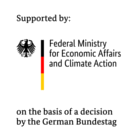20904 N

| Period: | 2019-11-01 to 2022-12-31 |
|---|---|
| Partner: | RWTH Aachen, Department of Ferrous Metallurgy (IEHK) |
| Funder: | Federal Ministry for Economic Affairs and Climate Action (BMWI, Germany) via AiF |
| Project Manager: | Till König |
| Division: | Materials and Corrosion |
| Team: | High Temperature Alloys |
Metal dusting is a severe type of high temperature corrosion occurring between temperatures of 450 and 800°C in carbon-supersaturated, reducing environments. It is widely found in industrial plants in the fields of conventional power technology, chemical and process industry, chemical technology and petrochemistry. However, the degradation mechanism and the exact conditions causing the material’s break-up are still under debate. Due to current policies relating to climate change, processes using CO2 and H2 as source materials to produce energy become more relevant and thereby also the need to understand and prevent metal dusting attack. Additionally, the efficiencies of existing processes are strongly linked to pressure and temperature. However, raising these parameters results in even harsher environments which in turn increases material damage. In most cases only small components are affected; however, due to the missing fundamental understanding a forecast of the material’s breakdown is difficult.
An approach to suppress metal dusting attack is the addition of catalytic inhibiting elements such as Cu to the alloy. Cu as well as Zn or Ge inhibit the deposition of carbon on the alloy surface. In this project, metal dusting of the 33 wt.% Cu-containing alloy Monel® alloy 400 and other Cu-containing Ni-based alloys (HR-235TM and Alloy 696) are investigated. Monel® alloy 400 are used in two conditions, samples are taken from conventionally cast material as well as additively manufactured using LPBF. Experiments in carburising atmospheres under normal pressure and 18 bar and 620°C are conducted. Additionally, mechanical properties such as creep, strength, and fatigue of the additively manufactured samples at room temperature and operating temperature are investigated at the Department of Ferrous Metallurgy (IEHK) at University Aachen.
In this research project the possibilities to build metal dusting resistant components using additive manufacturing are examined to enable fast and geometrical adapted solutions in the case of material break down. The main focus is to understand the Cu-induced catalytic inhibition and to investigate the effect of alloy manufacturing.
back

Das IGF-Vorhaben Nr. 20904 N der Forschungsvereinigung DECHEMA e.V., Theodor-Heuss-Allee 25, 60486 Frankfurt am Main wurde über die AiF im Rahmen des Programms zur Förderung der industriellen Gemeinschaftsforschung (IGF) vom Bundesministerium für Wirtschaft und Klimaschutz aufgrund eines Beschlusses des Deutschen Bundestages gefördert.
Till König
Tel.: +49 69 / 7564-134
E-mail: till.koenig
Final Report (pdf, 6.7 MB, in German)
K. Jahns, A.S. Ulrich, C. Schlereth, L. Reiff, U. Krupp, M.C. Galetz, Oxidation of Metals (2021)